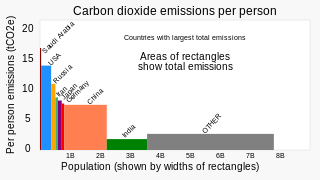Related Research Articles

Energy is sustainable if it "meets the needs of the present without compromising the ability of future generations to meet their own needs." Most definitions of sustainable energy include considerations of environmental aspects such as greenhouse gas emissions and social and economic aspects such as energy poverty. Renewable energy sources such as wind, hydroelectric power, solar, and geothermal energy are generally far more sustainable than fossil fuel sources. However, some renewable energy projects, such as the clearing of forests to produce biofuels, can cause severe environmental damage.

The energy policy of the European Union focuses on energy security, sustainability, and integrating the energy markets of member states. An increasingly important part of it is climate policy. A key energy policy adopted in 2009 is the 20/20/20 objectives, binding for all EU Member States. The target involved increasing the share of renewable energy in its final energy use to 20%, reduce greenhouse gases by 20% and increase energy efficiency by 20%. After this target was met, new targets for 2030 were set at a 55% reduction of greenhouse gas emissions by 2030 as part of the European Green Deal. After the Russian invasion of Ukraine, the EU's energy policy turned more towards energy security in their REPowerEU policy package, which boosts both renewable deployment and fossil fuel infrastructure for alternative suppliers.

A low-carbon economy (LCE) or decarbonised economy is an economy based on energy sources that produce low levels of greenhouse gas (GHG) emissions. GHG emissions due to human activity are the dominant cause of observed climate change since the mid-20th century. Continued emission of greenhouse gases will cause long-lasting changes around the world, increasing the likelihood of severe, pervasive, and irreversible effects for people and ecosystems. Shifting to a low-carbon economy on a global scale could bring substantial benefits both for developed and developing countries. Many countries around the world are designing and implementing low-emission development strategies (LEDS). These strategies seek to achieve social, economic, and environmental development goals while reducing long-term greenhouse gas emissions and increasing resilience to the effects of climate change.

Fossil fuel phase-out is the gradual reduction of the use and production of fossil fuels to zero, to reduce deaths and illness from air pollution, limit climate change, and strengthen energy independence. It is part of the ongoing renewable energy transition.
The Climate Investment Funds (CIF) was established in 2008 as a multilateral fund in order to finance pilot projects in developing countries at the request of the G8 and G20. The CIF administers a collection of programs with a view to helping nations fight the impacts of climate change and accelerate their shift to a low-carbon economy. Through contributions from 14 donor countries, CIF supports more than 350 projects in 72 low and middle-income countries on the frontlines of the climate crisis.

Eurelectric is the sector association which represents the common interests of the electricity industry at a European level, plus its affiliates and associates on several other continents. Together these organisations employ 970,000 people in the European Union and have a turnover of €627 billion. Formally established in 1989, Eurelectric covers all major issues affecting the sector, from generation and markets to distribution networks and customer issues.
Rovinari Coal Mine is an open-pit mining exploitation, the largest in Romania, located in Rovinari, Gorj County. The legal entity managing the Rovinari mine is the National Company of Lignite Oltenia which was set up in 1997.
The Cirebon Steam Power Plant is a 660 MW coal-fired power plant developed by PT Cirebon Electric Power (CEP) in the Kanci area to the southeast of Cirebon, Indonesia. The first unit of the plant was launched in mid October 2012. The reported cost of the plant was around $US 850 million. Construction began in 2008 and was substantially completed, a little behind time, in mid-2012. Sales from the plant to the Indonesian state-owned electricity company Perusahaan Listrik Negara (PLN) began on 27 July 2012.

Coal phase-out is an environmental policy intended to stop using the combustion of coal in coal-burning power plants, and is part of fossil fuel phase-out. Coal is the most carbon-intensive fossil fuel, therefore phasing it out is critical to limiting climate change and keeping global warming to 1.5 °C as laid out in the Paris Climate Agreement. The International Energy Agency (IEA) estimates that coal is responsible for over 30% of the global average temperature increase above pre-industrial levels.

In 2021, net greenhouse gas (GHG) emissions in the United Kingdom (UK) were 427 million tonnes (Mt) carbon dioxide equivalent, 80% of which was carbon dioxide itself. Emissions increased by 5% in 2021 with the easing of COVID-19 restrictions, primarily due to the extra road transport. The UK has over time emitted about 3% of the world total human caused CO2, with a current rate under 1%, although the population is less than 1%.

Climate change in Europe has resulted in an increase in temperature of 2.3 °C (2022) in Europe compared to pre-industrial levels. Europe is the fastest warming continent in the world. Europe's climate is getting warmer due to anthropogenic activity. According to international climate experts, global temperature rise should not exceed 2 °C to prevent the most dangerous consequences of climate change; without reduction in greenhouse gas emissions, this could happen before 2050. Climate change has implications for all regions of Europe, with the extent and nature of impacts varying across the continent.
The United Kingdom is committed to legally binding greenhouse gas emissions reduction targets of 34% by 2020 and 80% by 2050, compared to 1990 levels, as set out in the Climate Change Act 2008. Decarbonisation of electricity generation will form a major part of this reduction and is essential before other sectors of the economy can be successfully decarbonised.

An energy transition is a significant structural change in an energy system regarding supply and consumption. Currently, a transition to sustainable energy is underway to limit climate change. It is also called renewable energy transition. The current transition is driven by a recognition that global greenhouse-gas emissions must be drastically reduced. This process involves phasing-down fossil fuels and re-developing whole systems to operate on low carbon electricity. A previous energy transition took place during the industrial revolution and involved an energy transition from wood and other biomass to coal, followed by oil and most recently natural gas.

Renewables supply a quarter of energy in Turkey, including heat and electricity. Some houses have rooftop solar water heating, and hot water from underground warms many spas and greenhouses. In parts of the west hot rocks are shallow enough to generate electricity as well as heat. Wind turbines, also mainly near western cities and industry, generate a tenth of Turkey’s electricity. Hydropower, mostly from dams in the east, is the only modern renewable energy which is fully exploited. Hydropower averages about a fifth of the country's electricity, but much less in drought years. Apart from wind and hydro, other renewables; such as geothermal, solar and biogas; together generated almost a tenth of Turkey’s electricity in 2022.

Coal, cars and lorries vent more than a third of Turkey's five hundred million tonnes of annual greenhouse gas emissions—mostly carbon dioxide—and are part of the cause of climate change in Turkey. The nation's coal-fired power stations emit the most carbon dioxide, and other significant sources are road vehicles running on petrol or diesel. After coal and oil the third most polluting fuel is fossil gas; which is burnt in Turkey's gas-fired power stations, homes and workplaces. Much methane is belched by livestock; cows alone produce half of the greenhouse gas from agriculture in Turkey.

Greenhouse gas emissions by China are the largest of any country in the world both in production and consumption terms, and stem mainly from coal burning in China, including coal-fired power stations, coal mining, and blast furnaces producing iron and steel. When measuring production-based emissions, China emitted over 14 gigatonnes (Gt) CO2eq of greenhouse gases in 2019, 27% of the world total. When measuring in consumption-based terms, which adds emissions associated with imported goods and extracts those associated with exported goods, China accounts for 13 gigatonnes (Gt) or 25% of global emissions.

The European Green Deal, approved in 2020, is a set of policy initiatives by the European Commission with the overarching aim of making the European Union (EU) climate neutral in 2050. The plan is to review each existing law on its climate merits, and also introduce new legislation on the circular economy, building renovation, biodiversity, farming and innovation.
Green recovery packages are proposed environmental, regulatory, and fiscal reforms to rebuild prosperity in the wake of an economic crisis, such as the COVID-19 pandemic or the Global Financial Crisis (GFC). They pertain to fiscal measures that intend to recover economic growth while also positively benefitting the environment, including measures for renewable energy, efficient energy use, nature-based solutions, sustainable transport, green innovation and green jobs, amongst others.

How to Avoid a Climate Disaster: The Solutions We Have and the Breakthroughs We Need is a 2021 book by Bill Gates. In it, Gates presents what he learned in over a decade of studying climate change and investing in innovations to address global warming and recommends technological strategies to tackle it.
The South Africa Just Energy Transition Investment Plan (JET-IP) is a $8.5bn deal to help South Africa (ZA) decarbonise its economy, struck at COP26 in 2021. It is a cooperation between the governments of ZA, France, Germany, the United Kingdom, the United States and the European Union. It aims to help South Africa achieve the goals set out in its nationally determined contribution to the Paris Agreement, and prevent emissions of 1 to 1.5 gigatonnes of greenhouse gas emissions. The South African JETP was a model for a subsequent similar agreement on coal power in Indonesia, known as the Indonesia Just Energy Transition Partnership.
References
- ↑ "Indonesia Just Energy Transition Partnership Launched at G20". GOV.UK. Retrieved 2022-11-15.
- ↑ antaranews.com. "Indonesia negotiating funding cooperation for energy transition". Antara News. Retrieved 2022-11-14.
- ↑ "G7 offered Vietnam and Indonesia $15B to drop coal. They said 'maybe'". POLITICO. 2022-10-26. Retrieved 2022-11-14.
- ↑ "Deutsche G7-Präsidentschaft treibt ambitionierte Just Energy Transition Partnerships voran". Bundesministerium für wirtschaftliche Zusammenarbeit und Entwicklung (in German). Retrieved 2022-11-14.
- ↑ Lo, Joe (2022-11-07). "As Cop27 kicks off, where are the coal to clean deals at?". Climate Home News. Retrieved 2022-11-14.
- ↑ "U.S., Japan to offer Indonesia $15 bln in energy transition funds-Bloomberg News". Reuters. 2022-11-11. Retrieved 2022-11-15.
- ↑ "Press corner". European Commission - European Commission. Retrieved 2022-11-16.
- ↑ "Indonesia JETP - Accelerating Indonesia's Decarbonisation Timeline". Mayer Brown. Retrieved 2022-11-16.
- ↑ "How Indonesia, a major fossil-fuel user, plans to decarbonise". The Economist. ISSN 0013-0613 . Retrieved 2022-11-17.
- ↑ "ADB and Indonesia Partners Sign Landmark MOU on Early Retirement Plan for First Coal Power Plant Under Energy Transition Mechanism". Asian Development Bank. 2022-11-14. Retrieved 2023-07-19.